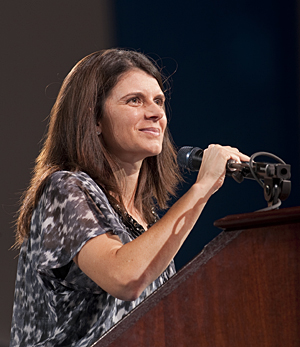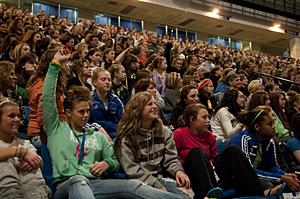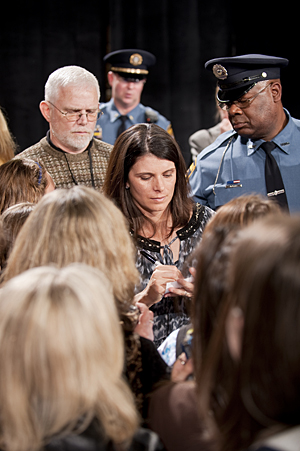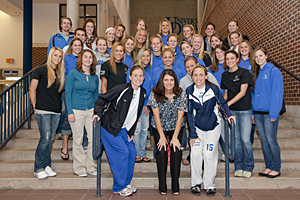
Javascript is required to view this video
ADVERTISEMENT
- Rozovsky wins prestigious NSF Early Career Award
- UD students meet alumni, experience 'closing bell' at NYSE
- Newark Police seek assistance in identifying suspects in robbery
- Rivlin says bipartisan budget action, stronger budget rules key to reversing debt
- Stink bugs shouldn't pose problem until late summer
- Gao to honor Placido Domingo in Washington performance
- Adopt-A-Highway project keeps Lewes road clean
- WVUD's Radiothon fundraiser runs April 1-10
- W.D. Snodgrass Symposium to honor Pulitzer winner
- New guide helps cancer patients manage symptoms
- UD in the News, March 25, 2011
- For the Record, March 25, 2011
- Public opinion expert discusses world views of U.S. in Global Agenda series
- Congressional delegation, dean laud Center for Community Research and Service program
- Center for Political Communication sets symposium on politics, entertainment
- Students work to raise funds, awareness of domestic violence
- Equestrian team wins regional championship in Western riding
- Markell, Harker stress importance of agriculture to Delaware's economy
- Carol A. Ammon MBA Case Competition winners announced
- Prof presents blood-clotting studies at Gordon Research Conference
- Sexual Assault Awareness Month events, programs announced
- Stay connected with Sea Grant, CEOE e-newsletter
- A message to UD regarding the tragedy in Japan
- More News >>
- March 31-May 14: REP stages Neil Simon's 'The Good Doctor'
- April 2: Newark plans annual 'wine and dine'
- April 5: Expert perspective on U.S. health care
- April 5: Comedian Ace Guillen to visit Scrounge
- April 6, May 4: School of Nursing sponsors research lecture series
- April 6-May 4: Confucius Institute presents Chinese Film Series on Wednesdays
- April 6: IPCC's Pachauri to discuss sustainable development in DENIN Dialogue Series
- April 7: 'WVUDstock' radiothon concert announced
- April 8: English Language Institute presents 'Arts in Translation'
- April 9: Green and Healthy Living Expo planned at The Bob
- April 9: Center for Political Communication to host Onion editor
- April 10: Alumni Easter Egg-stravaganza planned
- April 11: CDS session to focus on visual assistive technologies
- April 12: T.J. Stiles to speak at UDLA annual dinner
- April 15, 16: Annual UD push lawnmower tune-up scheduled
- April 15, 16: Master Players series presents iMusic 4, China Magpie
- April 15, 16: Delaware Symphony, UD chorus to perform Mahler work
- April 18: Former NFL Coach Bill Cowher featured in UD Speaks
- April 21-24: Sesame Street Live brings Elmo and friends to The Bob
- April 30: Save the date for Ag Day 2011 at UD
- April 30: Symposium to consider 'Frontiers at the Chemistry-Biology Interface'
- April 30-May 1: Relay for Life set at Delaware Field House
- May 4: Delaware Membrane Protein Symposium announced
- May 5: Northwestern University's Leon Keer to deliver Kerr lecture
- May 7: Women's volleyball team to host second annual Spring Fling
- Through May 3: SPPA announces speakers for 10th annual lecture series
- Through May 4: Global Agenda sees U.S. through others' eyes; World Bank president to speak
- Through May 4: 'Research on Race, Ethnicity, Culture' topic of series
- Through May 9: Black American Studies announces lecture series
- Through May 11: 'Challenges in Jewish Culture' lecture series announced
- Through May 11: Area Studies research featured in speaker series
- Through June 5: 'Andy Warhol: Behind the Camera' on view in Old College Gallery
- Through July 15: 'Bodyscapes' on view at Mechanical Hall Gallery
- More What's Happening >>
- UD calendar >>
- Middle States evaluation team on campus April 5
- Phipps named HR Liaison of the Quarter
- Senior wins iPad for participating in assessment study
- April 19: Procurement Services schedules information sessions
- UD Bookstore announces spring break hours
- HealthyU Wellness Program encourages employees to 'Step into Spring'
- April 8-29: Faculty roundtable series considers student engagement
- GRE is changing; learn more at April 15 info session
- April 30: UD Evening with Blue Rocks set for employees
- Morris Library to be open 24/7 during final exams
- More Campus FYI >>
1:51 p.m., March 24, 2010----Soccer star Mia Hamm shared her formula for success with an audience of more than 2,000 at the University of Delaware's Bob Carpenter Center on Tuesday, March 23. Her talk, “Achieving Personal Excellence,” was part of the UD Speaks series, which brings world-class leaders to the Delaware campus to educate, enlighten, and engage the University community.
Hamm, who led the U.S. national women's team to two FIFA World Cup titles and two Olympic gold medals, inspired a generation of little girls to become athletes and wear jerseys sporting the number “9.”
Hamm was the fourth in a family of six that moved from one Air Force base to another every few years. Those dynamics instilled an early competitive spirit in her. “What do I do with it now that I'm retired?” she asked. “I use it to beat you to the bananas in the grocery store.”
Although she was joking about racing for the bananas, the competitiveness that enabled Hamm to become the youngest person ever to play on the U.S. Women's National Team still burns in her. Now, as a wife and mother, a motivational speaker and head of a foundation, she has simply redirected it.
“I keep competing to spread the message that I was taught,” she said. “But I can't do it alone. I need you, but I don't need your time or your money. I need you to challenge yourself to be the best you can be -- for yourself, your family, your friends, your company.... You have to ask yourself how good you want to be.”
Hamm herself was asked that question by a coach when she was just a teenager. When she told him that she wanted to be the best, he responded, “Mia, it's a decision. It's easy to say it, but to get there you have to make that choice every day.”
And that was her message to the young players, college students, and adults in the audience -- never give up.
Hamm admitted that she was a terrible loser when she was growing up as a shy and undersized child. “But I learned through those losses that it wasn't about losing -- it was about the journey. Things like the Olympics and the World Cup were just the results, and there were a lot of failures on the way.”
If competitiveness was what drove Hamm to excellence, a strong teamwork ethic guided her along that path. She was invited to play on the national team at the age of 15, an experience that quickly took her to a new level in terms of both competition and teamwork.
“The women on the team were all gifted athletes. They could all pass, dribble, and shoot. But two things stood out for me: It was okay to compete, and teamwork always came first,” Hamm said.
At the University of North Carolina, Hamm found herself in a similar environment. The players were fiercely competitive with each other, keeping score on everything and racking up daily statistics on shots, assists, saves, sprints, and lifts. But the approach worked -- although they fought each other every day to be the best, they became stronger as a team in the process and completed their four years at UNC with a 94-1 record.
“What I recall most,” Hamm said, “was the coach telling us, 'Ladies, the reason we play is for each other.'”
Hamm's skills and accomplishments soon thrust her into the spotlight, a place that stirred up conflicting emotions for her. “I realized that an increase in success meant an increase in responsibility,” she said. “I wanted to keep the experience positive, but the last thing I wanted was for it to have a negative impact on the team.”
During the question-and-answer session that followed her presentation, Hamm fielded more than a dozen questions, many from young players. She talked about recovering from mistakes by channeling negative energy in a positive way, about using humor to break the tension that is inevitable among teammates, and about maintaining balance between school and sports.
“What was your favorite part of soccer when you were growing up?” asked one young fan.
“When I was your age,” Hamm answered, “it was the sodas after the game. With six kids in the family, we didn't get many sodas. As I got older, it was what the game asked of me every week and what I could learn about myself from playing it.”
“How did you overcome your shyness?” asked a college-age member of the audience.
“I still have it,” Hamm said. “It's a work in progress. Public speaking is just like anything else -- you have to train and hope that you'll get more comfortable with it.”
Despite her shyness, Hamm seemed comfortable delivering her message to the UD audience, perhaps because she is so comfortable with the message itself: “Each of you has a task to do and a vision of how it can be done better than it's ever been done before,” she said. “It's up to you to decide whether you want to do it.”
Article by Diane Kukich
Photos by Evan Krape and Doug Baker
Video by Andrea Boyle





